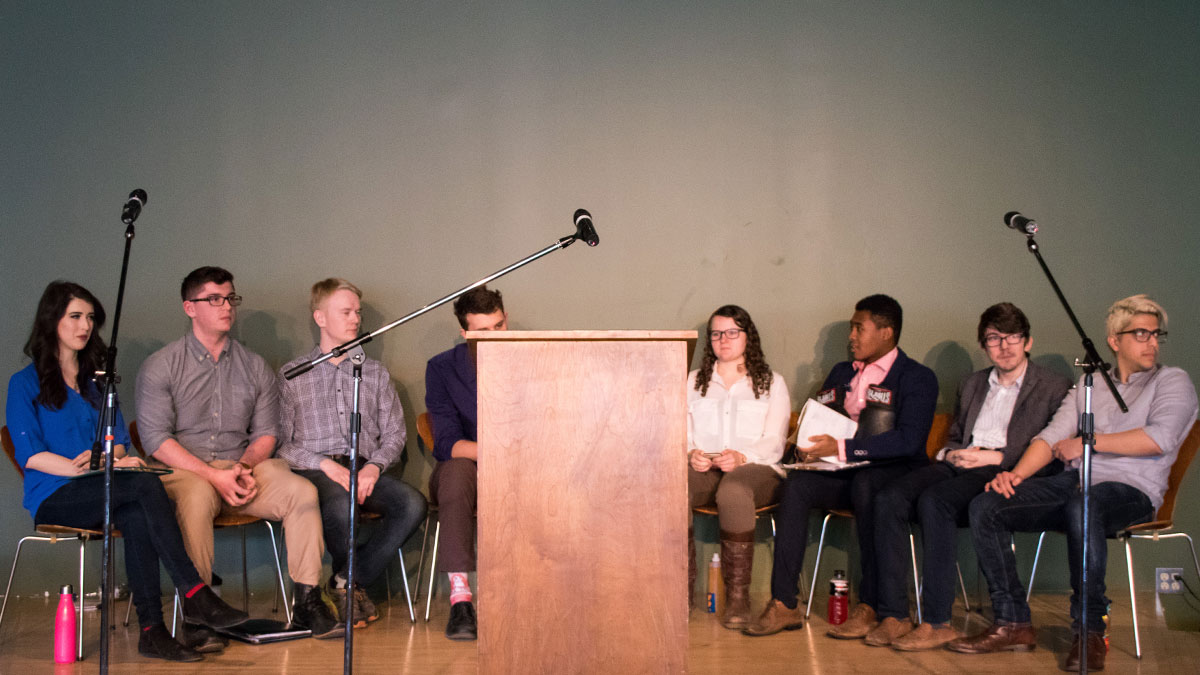 Christina Varvis
Christina VarvisAs always, the VP Academic platforms seem contrived because instruction at this institution is already very good. But some ideas are better than others.
Marina Banister has a long resume (which can be read on her campaign website) and she’s served on almost everything someone her age could have served on in this institution and in this city. Her strongest points are general administrative problems that need to be resolved. Students need diverse representatives and representatives need training she wants to provide through workshops. Banister also wants to hold student representatives accountable through data accumulation, and her efforts this year, such as an attendance record, have been successful. Metrics are a straightforward means of evaluating important aspects of performance. Also, students being able to major and minor in different faculties is long overdue.
I disagree with much of her academic platform. Students should have a certain level of flexibility in course choice, but there are pedagogical reasons, such as organization and time management, for rigid scheduling in certain programs. Students with too much choice allows them to avoid difficult courses and prevent knowledge from coherently building, much to the ire of Arts professors who must teach students with varying levels of knowledge. Arts students would probably benefit from more structure.
Banister’s point to “prioritize teaching quality” suggests she doesn’t understand the student’s role in the university. Students are usually unaware that 40 per cent of an academic staff member’s labour is dedicated to instruction, 40 per cent is dedicated to research, and 20 per cent to administrative duties. Unless students read the work of their instructors or understand enough about administration to have an opinion on it, students must accept that their say in deciding staff pay should be very limited.
A teaching tenure stream might be popular among those who currently work as contract instructors. Contract instructors at the U of A (or elsewhere) don’t work under particularly good conditions as pay is low (sometimes $20,000-$30,000), there aren’t always benefits, and they must reapply for their jobs every year. But there are a number of questions to be asked. What would tenured teachers be paid? Would they be guaranteed academic freedom? Would it signal the eventual erosion of the idea of tenure? Former VP Academic Fahim Rahman once suggested that the research these faculty could do is to research teaching, but not only is this telling professionals what to research, this might compromise their ability to keep up in an ever-changing discipline.
To get elected, Banister doesn’t even have to ask these questions. Her suggestion that instructors should be required to advertise mental health services reveals one of her fundamental assumptions: her platform points rely on a trust of administration above professors. Of all SU executives running, this shouldn’t be the attitude of the VP Academic. Banister is probably a good student politician, but her platform suggests that her advocacy is somewhat misguided.
Much of the same criticism can be applied to Tom Patrick since he has similar ideas. Rather than consulting staff, he asserts things. Eliminating textbooks is not his job and it would infuriate instructors. OERs are good but only if instructors consent. Patrick’s textbook ideas, as with many other VPA textbook ideas in recent memory, are contrived and unrealistic. I don’t mind the idea of making handbooks with information on the SU, but I can’t see it benefitting more than a few dozen people. Patrick doesn’t seem to have a clear idea of what academic staff do: of course balancing teaching and research is challenging, but this reason alone isn’t enough to warrant introducing a tenure teaching stream.
Banister seems to be the more experienced and competent of the two. To succeed in the position however, she must consult and trust professors before administration.




